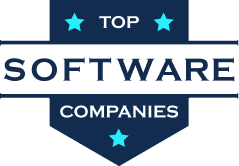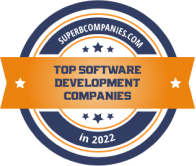IT Roadmap for Startups: From Launch to Scalability

Do you ever ask yourself how some start-ups move up the ladder with ease while others struggle to do so? The secret is sometimes having a strategic IT plan in place. This pace can be daunting to startups, especially because it’s in the technology industry, but it is also an opportunity to improve the odds.
This IT roadmap for growth, innovation, and success: From the choice of the right tool to creating value from the emerging technologies—AI. Now, let’s look at how you can map out the direction to enable your startup to grow from launch and prepare for scalability with ease.
Why Every Startup Needs an IT Roadmap
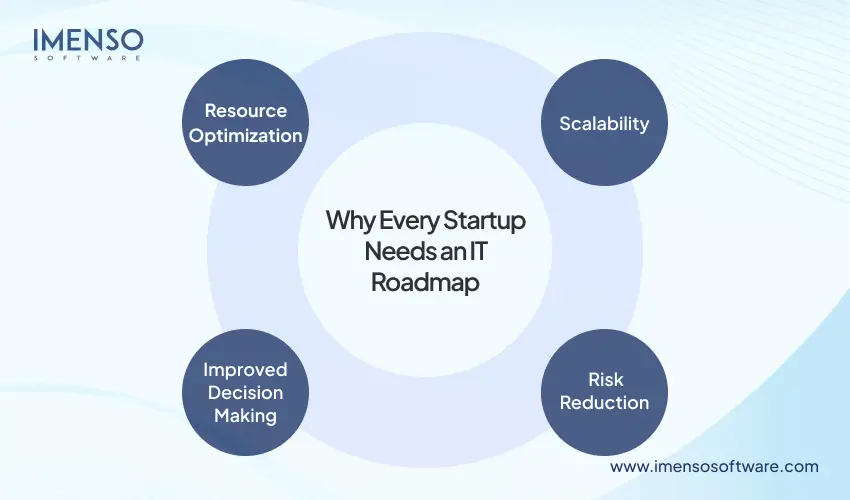
Startups own very few resources; they have limited financial capital and human capital in general. However, what this does imply is that you cannot afford to be negligent and not have a proper blueprint for IT.
An IT roadmap is not just a strategy—it is a framework that evolves with your organization, bringing insights into the specific solutions and infrastructure of technology that will help you succeed.
Here’s why an IT roadmap is essential for startups:
Resource Optimization:
If you are new to the market or an innovative company, then you probably cannot afford to invest in a fancy website design. An IT strategy guide allows you to decide which technologies will pay off more in the future and makes all the money being put into the IT department count.
Scalability
The only aim of any startup is growth. The economic factors that are most relevant in determining the success of your startup are IT scalability, cost reduction, and flexibility to adapt its infrastructure to the growing demand of the business, including the number of customers, transactions, and amounts of data.
Risk Reduction:
The inability to make adequate plans or foresee eventualities makes your business susceptible to security risks, data loss, and more system failure. First, an IT roadmap addresses such risks because it considers likely difficulties before they turn into issues.
Improved Decision Making
It can be looked at as a roadmap for decision-making in your startup, regardless of its development stage. It helps to plan for the future and not only for the day when you need some equipment to perform a definite job, thus your decisions about the technology being consistent with your strategic vision.
Phase 1: Launching Your Startup with a Solid IT Foundation
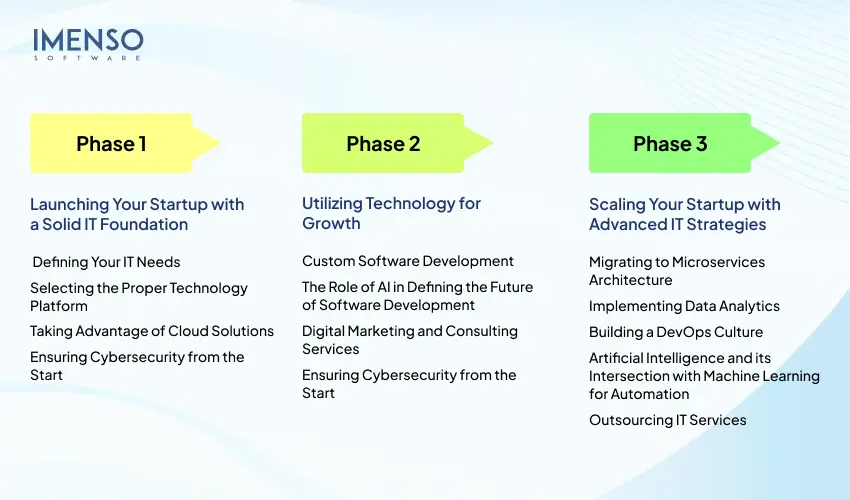
The launch phase of your startup is a critical time. During this period, you need to establish your business’s basic IT infrastructure, choose the right tools and technologies, and secure your data from day one. The foundation you build now will support your startup as it grows.
Defining Your IT Needs
Before you can build anything, you need to understand what your business truly needs from an IT perspective. Consider these questions:
- What type of business are you running? Are you offering a product or a service? Is your business tech-heavy, such as a SaaS model, or more traditional?
- What are your immediate IT priorities? Do you need an app, website, internal tools, or cloud infrastructure?
- What budget constraints do you have? Do not indulge in getting the best and most expensive IT products right from the start; instead, set realistic budget limits for yourself.
Finally, answering these questions can help you get a clear picture of what technologies you need to begin implementing your product or service.
Selecting the Proper Technology Platform
Choosing the right technology stack is one of the most important things you know about your startup. The term tech stack determines the compilation of technologies applied to create and manage your application.
Thus, the tools have to be more or less compatible with the aims and objectives of the specific enterprise and sufficiently flexible to meet its needs in the course of development.
A typical technology stack consists of the following components:
- Frontend (User Interface): Web development frameworks such as React.js, Angular, or Vue.js can be mentioned as the best tools for the development of innovative, responsive websites or applications.
- Backend (server-side): Some examples are technologies like Python, Node.js, Ruby on Rails, or PHP that help to perform server-side logic and data manipulation.
- Database: Startups employ relational databases, such as MySQL, PostgreSQL, or NoSQL databases, such as MongoDB, based on data requirements.
- Cloud Hosting: Ambient services are large cloud environments such as Amazon Web Services (AWS), Microsoft Azure, or the Google Cloud Platform (GCP) that offer flexible, economical platforms for presenting applications.
When choosing the stack, it is crucial to pay respect to the skills of your team and the type of business—it must be saleable and as flexible as possible.
Taking Advantage of Cloud Solutions
Cloud computing in particular, is an incredible opportunity for startups. They are the exact opposite of the on-premises structure, where organizations have to place large bets on physical computing hardware.
This structure enables you to avoid subscribing to services you don’t need while allowing you adaptability as needed.
Some key benefits of cloud computing include:
- Scalability: When scaling your startup, services such as AWS, Azure, or Google Cloud are perfect as they can simply expand your infrastructure to accommodate your business.
- Cost-Effectiveness: It is inexpensive as you only pay for the services you get from the service providers and not an extra dime.
- Flexibility: IaaS provides a host of tools and services available on cloud platforms that you can leverage to meet your company needs, such as storage, computing without servers, and AI.
The cloud is another area that must remain agile and secure. While perhaps not being the primary point of focus yet remaining cost-efficient and accessible, Microsoft Azure is a standout.
Ensuring Cybersecurity from the Start
When you are building the necessary groundwork for your startup, cybersecurity should not be an afterthought. Of late, aspiring business people promoting their start-up corporations are the most vulnerable to hackers’ attacks because the amounts of their collected data increase, and they may contain customer information and payments. To prevent breaches, consider implementing the following:
- Strong Password Policies: Use strong passwords and implement two-factor authentication (2FA) for access rights on all your accounts.
- Regular Software Updates: Ensure that all software, some of which are security patches, is always updated.
- Encryption: Provide protection to the data by means of encryption when in use, in transit, and in storage.
- Data Backups: Form the habit of frequently backing up data so that, in the event of an emergency, you are able to.
Phase 2: Utilizing Technology for Growth
However, after the startup formation process is complete and all the essential base IT infrastructure has been put in place, the growth phase can be thought to be the next stage.
Once you have the key software solutions that enable basic functioning and are well established, it will be possible for you to look at more complex systems that can help with internal processes, improve the experience of the end user, or increase the efficiency of a business.
Custom Software Development
As your start-up expands, you are likely to find yourself seeking application implementations that can be developed for your own specific circumstances. Other solutions can be bought off the shelf, which can be useful for a while; they do not allow you to make adjustments that your startup needs.
At this stage, getting professional help from a software development company can be really helpful. At Imenso Software, we provide startup software solutions that enable startups to have completely unique applications for their business, whether it will be for a CRM app, an ERP app, or e-commerce.
The Role of AI in Defining the Future of Software Development
AI is changing the approach used in creating software by emerging startups and the methods used in running the startups. AI thus helps businesses work with fewer manual inputs while also providing clients with customized services and products and helping estimate the market.
For instance, the adoption of AI and KYC can present customers with instant chatbot help, and ML can facilitate understanding of customer behaviors. The use of artificial intelligence in the design of the subsequent generation of applications is an essential subject for start-ups to remain relevant in the market today.
How AI is Shaping the Next Generation of Software Development is a crucial area for startups looking to stay competitive.
Digital Marketing and Consulting Services
In fact, marketing your product or service is just as significant as when you were creating the product or devising the service. One of the biggest risks for any startup is the lack of online representation – this means that no customers will find the startup, and it will be impossible to expand the company.
Digital marketing ensures that people are marketing their business to where they are, here on the digital platform.
Working with experts in digital marketing and consulting services can help you establish a solid digital marketing strategy that includes:
- Search Engine Optimization (SEO): Making sure that one’s website is among the top positions on search engines, that is, getting natural traffic.
- Social Media Marketing: Gathering and growing a loyal audience of fans and interacting with them.
- Pay-per-click (PPC) advertising: using targeted advertising to drive traffic and conversion in the shortest time possible.
As for digital marketing, consulting services can provide the proper advice on all the important business processes, such as market expansion or optimization of business processes for further growth.
Phase 3: Scaling Your Startup with Advanced IT Strategies
In my advice, there are some things you should consider as your startup grows and, as such, your IT requirements change. To do this, you will have to concentrate on complex approaches that guarantee the functionality of the business as you establish it and expand it to accommodate many clients.
Migrating to Microservices Architecture
As your product or service grows in complexity, consider transitioning to a microservices architecture. Unlike monolithic systems, microservices break your application into smaller, independent services that can be developed, deployed, and scaled independently. This approach allows you to:
- Scale individual components without affecting the entire application.
- Improve development speed as different teams can work on different services simultaneously.
- Increase the resilience of your application, as failures in one service don’t affect others.
Implementing Data Analytics
If there’s one resource that is absolutely precious for startups, it is data. Data analytics also enhances customer monitoring, performance appraisal, and general business decisions.
Some key analytics strategies include
- Customer Segmentation: organizing customers according to their demographic characteristics or their activities with the company to promote differentiated treatment.
- A/B Testing: The activity of comparing different versions of a product or service for customers in the marketing of the same product or service.
- Predictive Analytics: The application of historical data in the formulation of future plans or actions.
Building a DevOps Culture
DevOps is a process that is geared towards the provision of a collaboration between software developers and IT operations in order to offer a smooth stream for software delivery. In startups, when the team embraces DevOps culture, they can avoid problems that lead to longer turnaround times for products and incongruent communications.
Artificial Intelligence and its Intersection with Machine Learning for Automation
When your startup grows, your data increases even more, as will the number of processes that you require. AI, in particular, and machine learning, in general, can best be used to automate various processes, enhance productivity, and provide better customer satisfaction.
Beginning with predictive analytics all the way to fraud detection, the list of possibilities does not end.
Outsourcing IT Services
Last but not least, as your IT needs to evolve, some IT operations may be best handled by outsourcing them to specialists. This is especially the case with your software development, cloud management, or if you are implementing AI in your business—outsourcing can help you scale much more quickly and at a lower overhead cost.
FAQs
What is the IT roadmap, and why has it become important for startups?
An IT roadmap is a blueprint of solutions that will support a start-up in its current and future needs, which a start-up business will require after it launches and in the times to come. It aids in finding out the important technological activities and how they can be deployed at different stages. Nowadays, any startup company requires an IT strategy that defines the direction that the company is willing to take and how it has to prepare for future technical requirements in order not to overpay or, even worse, doom itself to failure.
What are the steps to select the appropriate technology infrastructure for a start-up?
When it comes to selecting the right technologies, the most crucial aspects that influence the choice are the nature of the business, the team, and the end vision the business has for the future. When selecting a tech stack, you should consider:
- The scalability and flexibility of the stack
- The ability to integrate with other tools and platforms
- The cost and availability of skilled developers
- Your specific use case, whether it’s web or mobile app development, data analysis, or cloud infrastructure.
If you want to avoid the wrong choice, it is better to consult with a consulting firm, for example, Imenso Software, which will help you choose the most appropriate stack for your startup.
How can cloud computing help my startup scale quickly?
When adopted, cloud computing provides startups with a rather flexible, inexpensive, and elastic environment. Thus, instead of buying different hardware for the initial capital, startups can lease computing power from the cloud, such as using AWS, Microsoft Azure, or Google Cloud. Such flexibility in terms of usage makes it easy to add up or subtract more rooms depending on the increasing customer traffic or cutting down on the fixed cost of infrastructure in maintaining physical servers.
What role does artificial intelligence (AI) play in startup growth?
AI can make a great difference to every startup. It defines the representation of the automation of processes, the enhancement of decision-making, and the display of customers’ preferences. The technology is a tool that can be used to integrate work processes and perform repetitive tasks, quickly generate effective ads, and analyze the results. AI technologies help startups optimize and automate their processes and, therefore, become more competitive, which will let them focus on product development and expansion.
Also read:
Code Refactoring in Software Development: When and Why Do It
Monetize Your App Ideas by Partnering with Development Experts
7 Must-Have IT Solutions to Boost Workflow Efficiency in Startups
Conclusion
The creation of a great startup company is a process that takes a lot of effort and requires changing and using the correct tools. The roadmap on IT helps you avoid being blindfolded in managing the IT requirements of your business in the course of your enterprise’s establishment and development.
It means that the right IT strategy covers the basic fundamentals and extends right up to the higher levels of adoption, such as artificial intelligence integration or the adoption of digital marketing strategies for the organization’s success.
In this article, we’ve seen ways that Imenso Software can help your startup grow and thrive. Whether getting an application built, promoting your business online, extending your business via social media, or adopting artificial intelligence into your business, we are your partner in creating the digital solutions that you want. Read our reviews on Clutch to learn how we have helped businesses like yours.
Feeling up for the next level of your startup? Get in touch with us today to develop your strategic IT plan that will create your IT success.
Want more information about our services?
Similar Posts

Types Of Applications That Can Be Built With Python
Did this ever happen that your favorite restaurant started serving mustard and ketchup on the side rather than putting it in the cheeseburger? Or has your gym started stacking high-absorbent cotton towels (the soft ones) instead of normal low-absorbent ones? (The soft ones feel different, right?) And such changes are the most obvious constant in […]...

Agile vs Waterfall software development Methodology
Any software development company has to decide about the methodology suited for their projects. There are two mighty and time tested choices, respectively as waterfall and agile software development methodology. To be precise, both are far from opposed to each other as antagonist opposites. But these two methodologies clearly shows the evolution of the software […]...
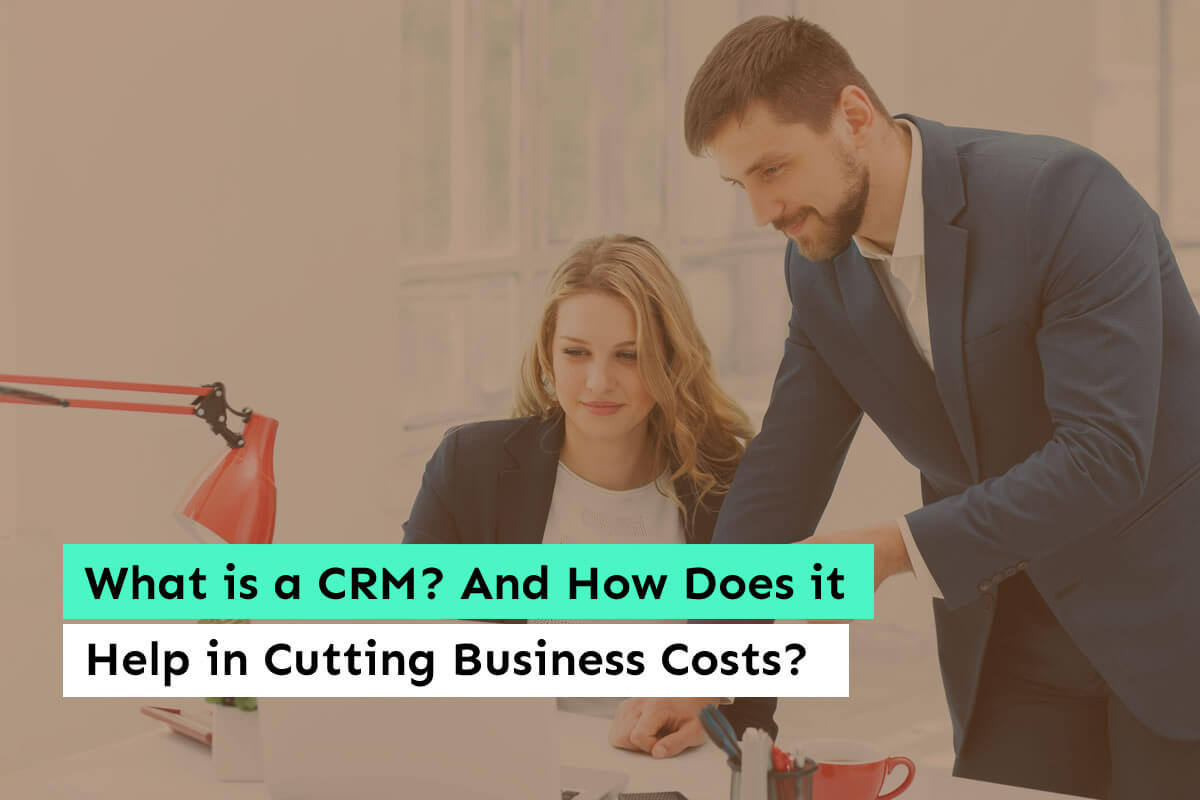
What is a CRM? And How Does it Help in Cutting Business Costs?
Do you how much money is lost due to poor customer service every year? $1.6 Trillion! Poor customer service may result because of various reasons, but the most common is that businesses fail to understand their customer’s needs and expectations. Are there always some unhappy customers present? True, but they are just a minute percentage […]...


